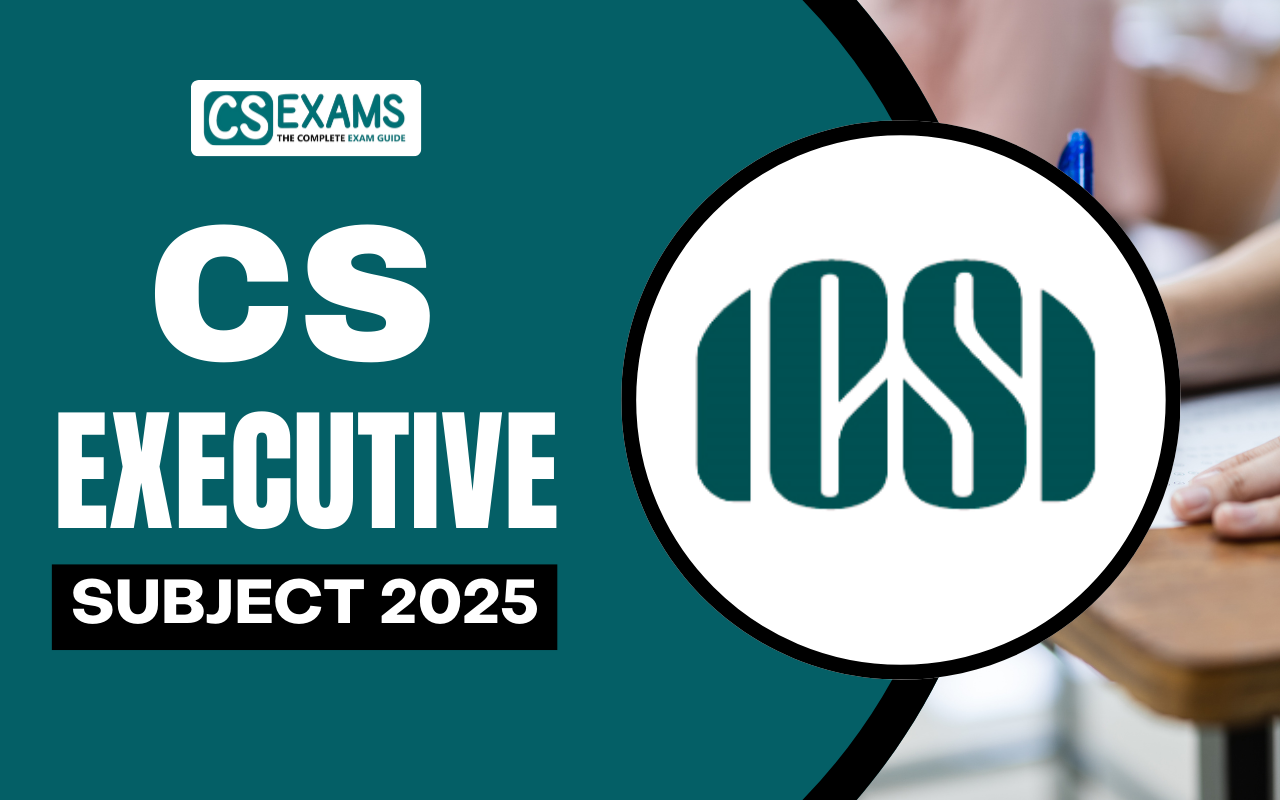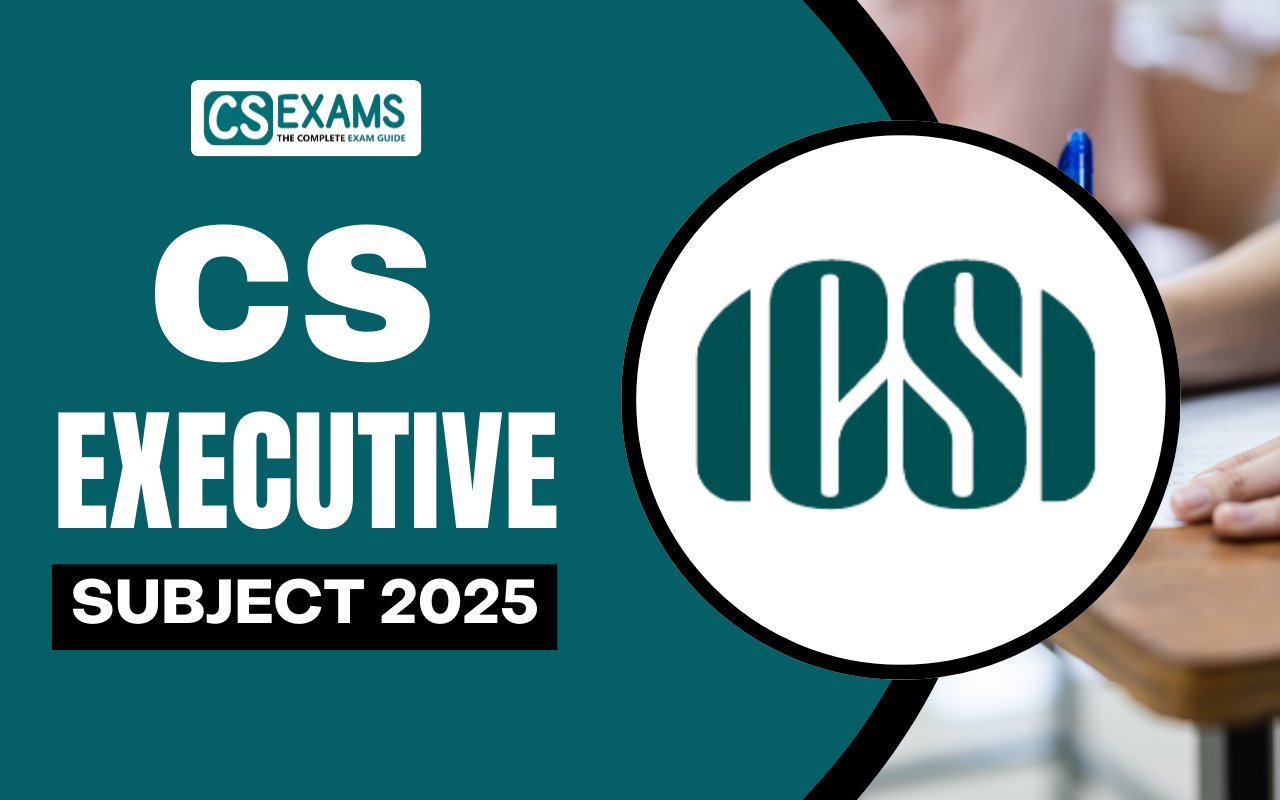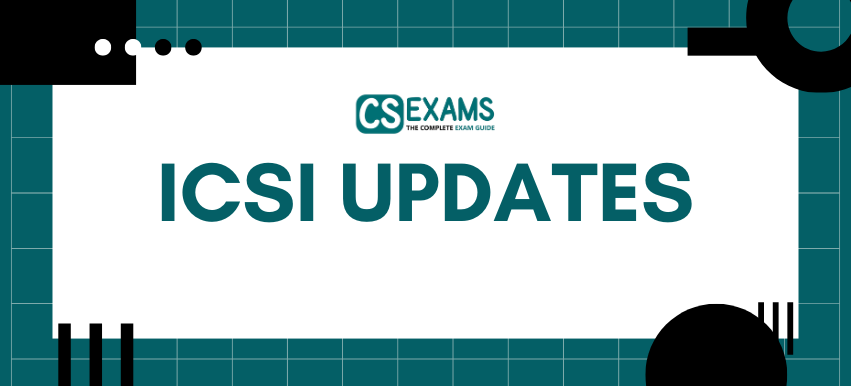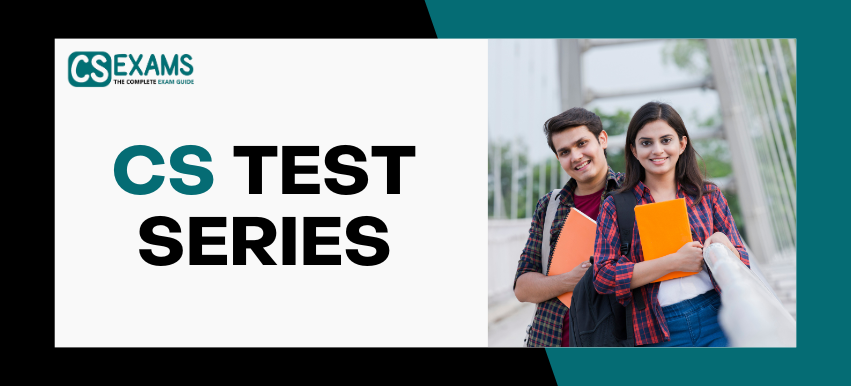The ICSI CS Executive Course for 2026 is the backbone of the preparation of candidates of Commerce who want a career as a company secretary. It is important to be updated with the latest CS executive syllabus and new exam pattern, as ICSI often modifies its content to develop business laws, governance trends, and compliance frameworks.
The new course, introduced in 2022, the executive program, has been structured to align with the needs and legal framework of real-world corporate administration. It contains two modules—Group I and Group II - which include a total of seven papers. The subjects are designed to understand a student's understanding of corporate operations and the legal-regulatory ecosystem that controls companies in India.
This article provides all aspects of the 2026 CS Executive Examination, which includes paper patterns, module-wise subjects, major changes, and proven strategies-Candidates creating a skilled study plan and avoid general losses.
Overview of CS Executive June 2026
The table below represents a quick overview of the CS Executive 2026:
| CS Executive 2026 Overview | |
| Particulars | Details |
| Full Exam Name | CS Executive Exam |
| Conducting Body | Institute of Company Secretaries of India |
| Frequency of Conduct | 2 times a year |
| Exam Level | National Level Exam |
| Languages | English |
| Mode of Application | Online |
| Application Fee (General) | 2000 Rs [Online] |
| Mode of Exam | Offline |
| Exam Duration | 3 Hours |
| Official Website | icsi.edu |
Enroll Now for CS Executive Courses
ICSI CS Executive Subjects List For Jan 2026
The updated CS Executive Courses include eight major papers divided into two modules. Each module addresses the law and commerce subjects of the core company, legal compliance, and promotion of coverage in accounting, governance, and finance. Understanding each module is important for setting realistic goals and planning a modification window.
| Paper Number | Subjects |
| Paper 1 | Jurisprudence, Interpretation, and General Laws |
| Paper 2 | Company Law and Practice (Part 1: Company Law—Principles & Concepts) (Part 2: Company Administration and Meetings) |
| Paper 3 | Setting Up of Business, Industrial, and Labour Laws (Part 1: Setting up of Business) (Part 2: Industrial and Labour Laws) |
| Paper 4 | Corporate Accounting and Financial Management (Part 1: Corporate Accounting) (Part 2: Financial Management) |
| CS Executive Syllabus - Group 2 | |
| Paper 5 | Capital Market and Securities Law (Part 1: Capital Market) (Part 2: Securities Laws) |
| Paper 6 | Economic, Commercial, and Intellectual Property Law (Part 1: Economic & Commercial Laws) (Part 2: Intellectual Property Laws) |
| Paper 7 | Tax Laws and Practice (Part 1: Direct Tax) (Part 2: Indirect Tax—GST & Customs) |
Paper-wise CS Executive Core Subjects
Understanding the main subjects of the CS Executive Program is necessary for effective preparation. Each paper is designed to develop a legal, managerial, and strategic understanding of a candidate of corporate practices. Let us closely look at the subjects covered under each module in a structured, paper-wise format.
| ICSI CS Executive Subjects Paper-Wise | |
| Module 1: Paper 1: Jurisprudence, Interpretation and General Laws (Max Marks 100) | |
| Sources of Law | Law relating to Specific Relief |
| Constitution of India | Law relating to Arbitration, Mediation, and Conciliation |
| Interpretation of Statutes | Indian Stamp Law |
| Administrative Laws | Law Relating to Registration of Documents |
| Law of Torts | Right to Information Law |
| Law relating to Civil Procedure | Law relating to Information Technology |
| Laws relating to Crime and its Procedure | Contract Law |
| Criminal Procedure Code, 1973 | Law Relating to the Sale of Goods |
| Law relating to Evidence | Law Relating to Negotiable Instruments |
| Law relating to Limitation | |
| Module 1: Paper 2: Company Law (Max Marks 100) | |
| Part 1 Company Law—Principles & Concepts | |
| Introduction to Company Law | Distribution of Profits |
| Shares and Share Capital-Concepts | Dormant Company |
| Charges | Memorandum and Articles of Association and their Alteration |
| Compromise, Arrangement, and Amalgamation: Concepts | Debt Instruments—Concepts |
| Legal Status and Types of Registered Companies' Accounts and Auditors | Accounts and Auditors |
| Members and shareholders | Inspection, Inquiry, and Investigation |
| Part 2: Company Administration and Meetings | |
| General Meetings | Corporate Social Responsibility-Concepts |
| Meetings of the Board and its Committees | Board Composition and Powers of the Board |
| Key Managerial Personnel (KMPs) and their Remuneration | Annual Report—Concepts |
| Directors | |
| Module 1- Paper 3: Setting up of Business Entities and Closure (Max Marks 100) | |
| Part 1: Setting up the Business | |
| Selection of Business Organization | Financial Services Organization |
| Startups and Their Registration | Setting up of Business outside India and Issue Relating Thereto |
| Non-Corporate Entities | Limited Liability Partnership |
| Setting up of a Branch Office/Liaison Office/Wholly owned Subsidiary by a Foreign Company | Conversion of Business Entities |
| Various Initial Registrations and Licenses | Business Collaborations |
| Corporate Entities—Companies: Types of Corporate Business Entities, Drafting of Incorporation Documents, Formation and Registration | Identifying laws applicable to various Industries and their initial compliance |
| Micro, Small, and Medium Enterprises | |
| Part 2: Industrial and Labour Laws | |
| Constitution and Labour Laws | Law of wages |
| Law of Industrial Relations | Law of Welfare & Working Conditions |
| Sexual Harassment of Women at Workplace (Prevention, Prohibition and Redressal) Act, 2013 | Social Security Legislation |
| Evaluation of Labour Legislation and the Need for a Labour Code | |
| Module 1: Paper 4: Corporate Accounting and Financial Management (100 marks) | |
| Part 1: Corporate Accounting | |
| Introduction to Accounting | Accounting for Debentures |
| Accounting for Share Capital | Financial Statement Analysis |
| Consolidation of Accounts | Related Aspects of Company Accounts |
| Forecasting Financial Statements | Cash Flows |
| Introduction to Corporate Accounting | |
| Part 2: Financial Management | |
| Introduction | Security Analysis |
| Cost of Capital | Capital Budgeting |
| Working Capital Management | Dividend Decisions |
| Time Value of Money | Operational Approach to Financial Decision |
| Capital Structure | |
| Module 2 Paper 5: Capital market and securities law | |
| Part 1: Capital Market | |
| Basics of the Capital Market | Laws Governing Depositories and Depository Participants |
| Securities and Exchange Board of India | Securities Contracts (Regulations) Act 1956 |
| International Financial Services Centres Authority (IFSCA) | Securities Market Intermediaries |
| Secondary Market in India | |
| Part 2: Securities Law | |
| Issue of Securities – Concepts | Mutual Funds |
| Acquisition of Shares and Takeovers—Concepts | Listing Obligations and Disclosure Requirements |
| Delisting and Buyback of Securities—Concepts | Prohibition of Fraudulent and Unfair Trade Practices Relating to Securities Market |
| Issue and Listing of Non-Convertible Securities | Collective Investment Schemes |
| Prohibition of Insider Trading | |
| Module 2: Paper 6: Economic, commercial, and intellectual property laws | |
| Part 1: Economic & Commercial Laws | |
| Law relating to Foreign Exchange Management | Prevention of Money Laundering |
| External Commercial Borrowings (ECB) | Competition Law |
| Law relating to Foreign Contribution Regulation | Real Estate Regulation and Development Law |
| Law relating to Benami Transactions & Prohibition | Overseas Direct Investment |
| Legal Metrology | Law relating to Special Economic Zones |
| Foreign Direct Investments – Regulations & Policy | Law relating to Fugitive Economic Offenders |
| Foreign Trade Policy & Procedure | Law relating to Consumer Protection |
| Part 2: Intellectual Property Laws | |
| Law relating to Patents | Law relating to Trademarks |
| Law relating to Geographical Indications of Goods | Law relating to Industrial Designs |
| Law relating to Copyright | |
| Module 2: Paper 7: Tax Laws and Practice (100 marks) | |
| Part 1: Direct Tax | |
| Direct Tax at a Glance | Income from Other Sources |
| Income under the Head of Salary | Computation of Total Income and Tax Liability of various entities |
| Capital Gains | Incomes that do not form part of Total Income |
| Deductions | Profits and Gains from Business and Profession |
| Procedural Compliance | Clubbing provisions and Set Off and/or forward of Losses |
| Basic Concept of Income Tax | Classification and Tax Incidence on Companies |
| Income under the Head of House Property | |
| Part 2: Indirect Tax (GST & Customs) | |
| Concept of Indirect Taxes at a Glance | Input Tax Credit & Computation of GST Liability |
| Time, Value & Place of Supply | Levy and Collection of GST |
| Overview of the Customs Act | Procedural Compliance under GST |
| Basics of Goods and Services Tax (GST) | |
Additional Tips for CS Executive 2026
- Pre-Of Examination Test (PET): Under the new course, all registered students must complete an online pre-examination test before being eligible to enroll for executive and professional examinations. The pet fee is ₹ 1,000 and should be completed through the ICSI E inga Learning portal.
- Syllabus switchover details: If you were on the old (2017) syllabus and want to convert to the new courses (2022), official discounts are available in the Mapping Section section section mapping on the ICSI site. The last old course attempt was June 2024.
- Course period limit: A candidate must complete the executive program within 3 years from registration; otherwise, registration is necessary, and professional programs within 5 years.
Why Choose CS Exam Test Series for CS Preparation
When it comes to preparing for the hard CS exams, choosing the right test series can make all the difference. csexams.in has emerged as a trusted and result-oriented platform for CSEET, Executive, and Professional-level aspirants. Here's why it should be your first choice:
- Trusted by Thousands of CS Aspirants: The CS Exam has built a strong reputation among CS students for its consistent quality and excellent student feedback.
- ICSI Pattern-Based Question Papers: All tests are strictly based on the latest ICSI exam pattern and syllabus, ensuring real exam-like practice.
- Timely Evaluation with Expert Feedback: Get your answers evaluated within 48–72 hours along with detailed feedback, a marking scheme, and improvement tips.
- Personalized Mentorship & Study Planner: Get personalized mentorship, performance tracking, and a daily study plan customized to your syllabus completion pace.








